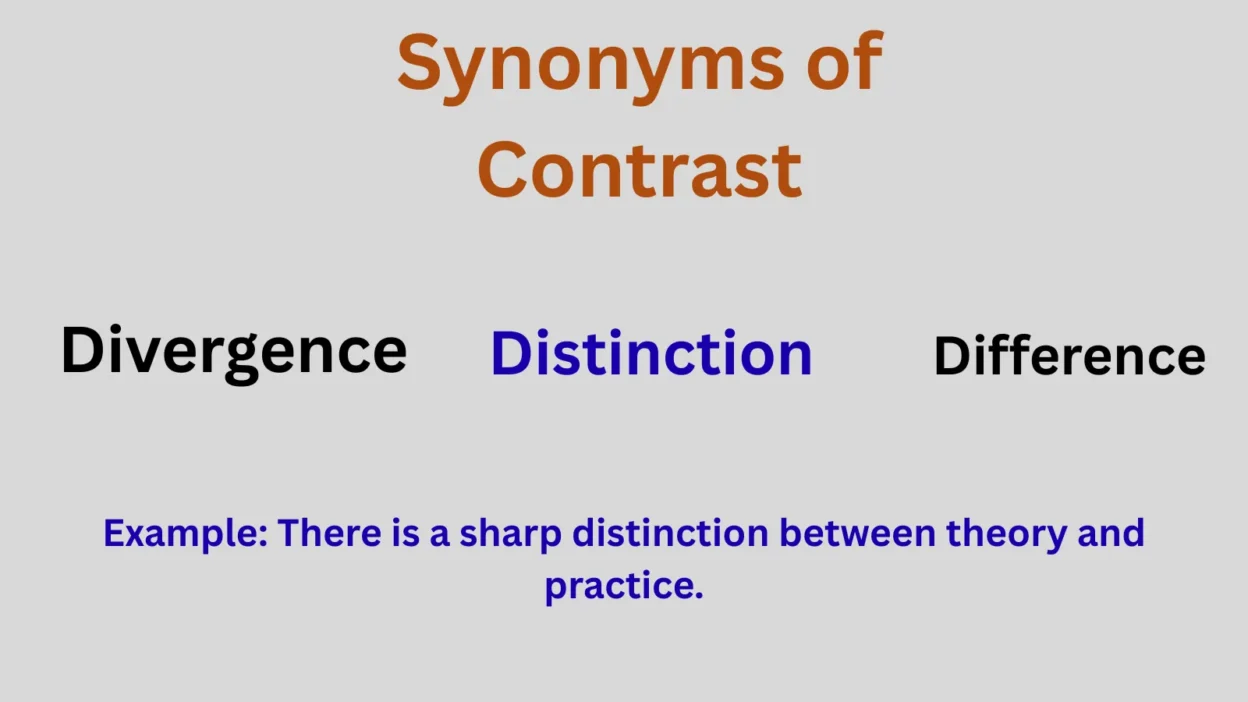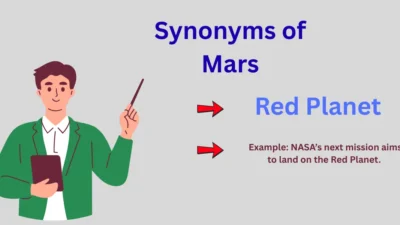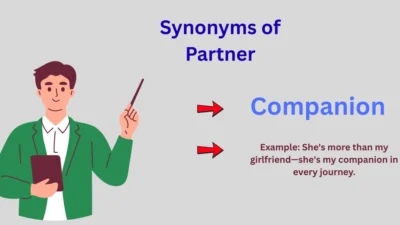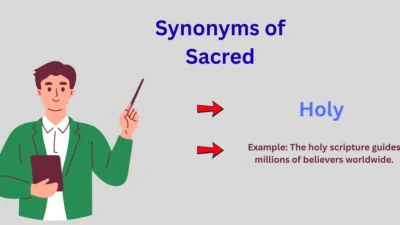The word contrast makes us think of things that are strikingly different—like black and white, night and day, or ideas that clash. At its core, contrast shows difference, comparison, or opposition between two or more things. That is why many writers and readers search for synonyms of contrast. Using the right synonym can make your writing sharper, clearer, and more vivid.
Contrast is more than just being different. It often brings a sense of clarity, sharpness, or drama. Something noticeably different stands out, sometimes with a touch of surprise or tension.
This guide explores 35 useful synonyms of contrast, explaining their meanings, best uses, and emotional tones. You will see how each word can make your writing or speech more precise, expressive, and engaging.
What Does Contrast Really Mean?
At its core, contrast is about comparison to show difference. This could be in color, ideas, emotions, or any elements that gain meaning through their opposition or distinction. The word often implies clarity and sharpness—differences that stand out vividly rather than blend.
In literature and speech, contrast can create emphasis, highlight conflict, or add depth. Knowing the right synonym can help you express subtle shades of difference, from gentle distinctions to bold oppositions.
Synonyms of Contrast (with Descriptions & Examples)
1. Difference
Definition: A general term for when two things are not the same.
Best For: Simple, neutral comparison.
Example: The difference between the two fabrics is texture, not color.
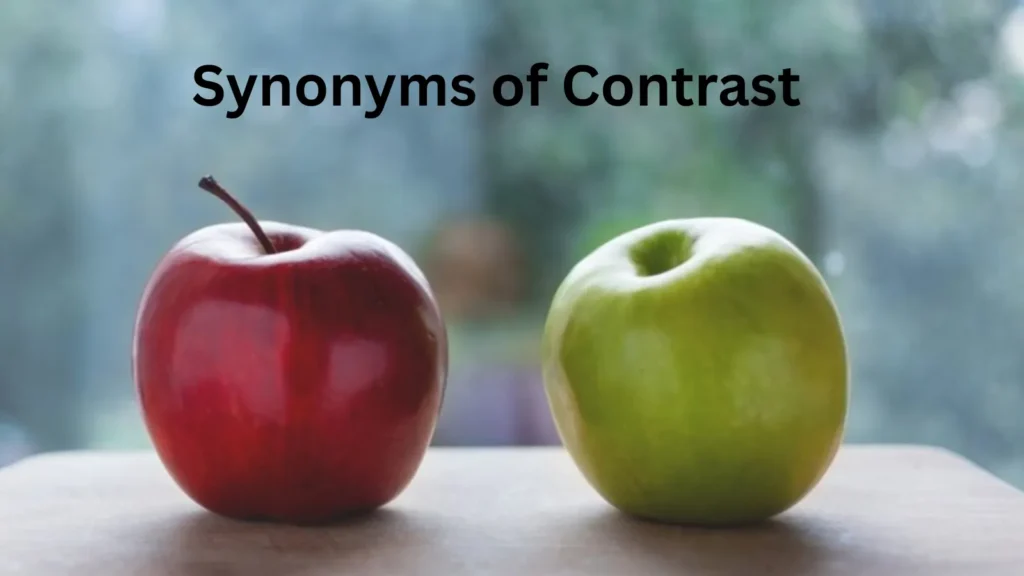
2. Divergence
Definition: A moving or growing apart from a common point.
Best For: Formal or scientific contexts.
Example: There was a clear divergence in their opinions after the meeting.
3. Disparity
Definition: An inequality or significant difference, often with a negative tone.
Best For: Social or economic contrasts.
Example: The disparity between the rich and the poor continues to grow.
4. Distinction
Definition: A clear or important difference that sets things apart.
Best For: Polished or academic writing.
Example: There is a sharp distinction between theory and practice.
5. Variation
Definition: A change or slight difference in condition or appearance.
Best For: Scientific or casual use.
Example: The temperature variation affected the crop yield.
6. Opposition
Definition: A direct contrast or conflict between ideas or forces.
Best For: Strong, conflict-based contrasts.
Example: The opposition between the two political parties is stark.
7. Polarity
Definition: A situation with two opposite qualities or opinions.
Best For: Technical or philosophical discussion.
Example: The polarity of views made compromise difficult.
8. Contradiction
Definition: When two things directly oppose or deny each other.
Best For: Logical or argumentative contexts.
Example: His statement was in direct contradiction to the facts.
9. Antithesis
Definition: The exact opposite or a sharp contrast, often used rhetorically.
Best For: Literary or persuasive writing.
Example: Love is the antithesis of selfishness.
10. Incongruity
Definition: When things don’t match or fit together logically.
Best For: Humorous, ironic, or critical use.
Example: There was an incongruity between her cheerful words and sad eyes.
11. Discrepancy
Definition: A lack of compatibility or consistency between facts or figures.
Best For: Formal or technical contexts.
Example: The accountant found a discrepancy in the balance sheets.
12. Contrastation
Definition: The act of contrasting or setting things in opposition.
Best For: Rare or formal usage.
Example: The contrastation between urban and rural lifestyles is evident.
13. Comparison
Definition: The act of examining similarities and differences.
Best For: Neutral, general use.
Example: A comparison of the two paintings reveals subtle differences.
14. Oppositeness
Definition: The state of being opposite or contrary.
Best For: Informal or descriptive writing.
Example: The oppositeness of their personalities was obvious.
15. Juxtaposition
Definition: Placing two things close together for a contrasting effect.
Best For: Artistic or literary contexts.
Example: The film’s use of light and shadow created a powerful juxtaposition.
16. Disjunction
Definition: A separation or disconnection between things.
Best For: Formal, philosophical, or technical writing.
Example: There was a disjunction between his words and actions.
17. Contrariety
Definition: The state of being contrary or opposed.
Best For: Literary or archaic tone.
Example: Their contrariety led to endless debates.
18. Antipode
Definition: The exact opposite or something opposed.
Best For: Poetic or formal use.
Example: The city and the countryside are antipodes in lifestyle.
19. Reverse
Definition: The opposite or backward version of something.
Best For: Everyday or informal use.
Example: The reverse of her plan turned out to be more effective.
20. Dissimilarity
Definition: Lack of similarity or likeness.
Best For: Neutral or academic contexts.
Example: The dissimilarity between the twins was striking.
21. Dichotomy
Definition: A division into two mutually exclusive or contradictory groups.
Best For: Formal, analytical, or philosophical writing.
Example: The dichotomy between good and evil is central to the story.
22. Variance
Definition: The fact or quality of being different, especially in amounts or levels.
Best For: Statistical, scientific, or legal writing.
Example: There was a large variance in test scores across schools.
23. Gap
Definition: A break or difference between things.
Best For: Casual or descriptive contexts.
Example: The generation gap influences their viewpoints.
24. Imbalance
Definition: Lack of balance or equality between parts.
Best For: Critical or social commentary.
Example: The economic imbalance affects social stability.
25. Oppugnancy
Definition: The act of opposing or contradiction.
Best For: Rare or formal literary use.
Example: The oppugnancy between their theories fueled debate.
26. Discordance
Definition: Lack of harmony or agreement.
Best For: Musical, social, or emotional contexts.
Example: There was discordance in the team’s opinions.
27. Disparateness
Definition: The quality of being essentially different or distinct.
Best For: Formal or philosophical writing.
Example: The disparateness of their backgrounds enriched the project.
28. Incompatibility
Definition: The state of being unable to coexist or work together.
Best For: Relationship or technical contexts.
Example: The incompatibility of the software caused crashes.
29. Contraposition
Definition: A logical or rhetorical opposition.
Best For: Philosophical or academic writing.
Example: The contraposition of ideas clarified the argument.
30. Mismatch
Definition: Things that do not correspond or fit well together.
Best For: Informal or conversational use.
Example: There was a mismatch between his skills and the job requirements.
Choosing the Right Synonym: When to Use Which?
- Neutral and simple? Use difference, comparison, or gap.
- Strong opposition? Choose antithesis, opposition, or contradiction.
- Formal or academic? Disparity, dichotomy, or variance fit well.
- Artistic or literary? Pick juxtaposition, antithesis, or contrariness.
- Every day conversation? Try mismatch, reverse, or difference.
Tone also matters:
- For technical or scientific discussions, words like variance, discrepancy, or incompatibility are precise and clear.
- For emotional or philosophical writing, dichotomy, polarity, or contraposition carries depth and nuance.
- In social or political commentary, disparity, imbalance, or discordance often highlight issues of fairness or conflict.
Conclusion
Understanding the many ways to express difference makes your writing stronger. Using synonyms of contrast lets you highlight distinctions with precision and style. Some words show clear opposition, while others add subtle variety or nuance.
Choosing the right synonym helps your sentences stand out and feel more engaging. If in stories, essays, or daily writing, these alternatives give you control over tone and meaning. Mastering them expands your vocabulary and makes your ideas easier to understand.
Language becomes more vivid when you have multiple ways to express a single idea. Every synonym you learn adds depth and flexibility to your writing.

